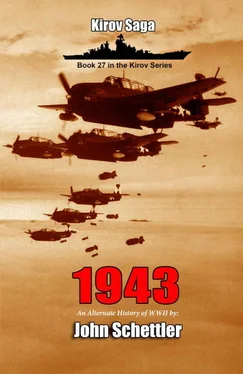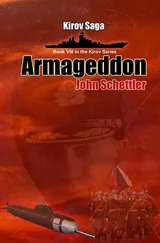“My God,” said Paul. “Here we thought we had trouble sinking the Bismarck as it was supposed to happen. Will you look at the carnage this ship has caused?”
“I don’t see any way we can get a handle on this,” said Maeve. “Look at that splintering! We’ve got three threads now. The Gamma thread is the one closest to the original in terms of overall integrity, but look, it’s already beginning to receive contamination from the other two. Beta thread is almost completely unrecognizable now, at least insofar as WWII is concerned. There is no way we could intervene to try and reverse all the changes there. How do we stop Germany from taking Gibraltar, or reaching Moscow as they did in that history? It’s impossible.”
“There might be Pushpoints out there somewhere,” said Paul, and he was very correct. Given enough time and research, they might have discovered the seemingly insignificant life of one Juan Alphonso, the engineer who stopped the leaky roof in a train car on the eve of a very important meeting. It was his little piece of cheesecloth that handed the Rock to Germany, though none of them knew that at that moment.
“You’re right, Maeve,” said Paul. “If it were just one variation, one battle or sinking like the Bismarck , then we might have a chance to correct it. But WWII is a maze of consequence. There must be thousands of Pushpoints driving these events. We’d never find and correct them all in a lifetime.”
“So we’ve got to ignore the history of the war,” said Nordhausen. “We’ve got to go further back—to the source—Tunguska.”
“How do you stop that?” said Kelly. “Isn’t that an imperative, an act of nature that we can do nothing about.”
“I once thought that,” said Paul, but look here in 1942 on the Beta thread—Krakatoa blew up!”
“Right,” said Nordhausen. “Scroll back to August 26, 1883 when it was supposed to erupt. There’s no sign of that event now—at least not on the Beta thread.”
“Damn amazing,” said Paul. “How do we get variations like this that change historical imperatives? I can see how the weather might change, but volcanic activity? That tells me that whatever happened to alter that meridian was so profound that it literally changed everything, even the pressure and buildup of the magma chamber beneath Krakatoa.”
“That’s damn odd,” said Maeve. “1883 predates the Tunguska Event in 1908. How could the latter affect the former in any way, shape or form?”
“Right,” said Nordhausen. “How could a suspected cause follow an effect?”
“Admittedly, its confounding in the classical physics of the macro world,” said Paul, “but not on the quantum level of things. Causality is the notion that events happening now in the present are caused by events in the past, the domino theory. Caslav Brukner’s team at the University of Vienna has already published research claiming that it is possible that a single event could be both a cause and an effect insofar as quantum mechanics is concerned. They call it ‘Quantum violation of causal order.’ We won’t get into it here, but it can happen. Bottom line: causal order might not be a mandatory property of nature, so that means my concept of an imperative event like that eruption is suspect.”
“I still don’t see how Tunguska in 1908 prevents Krakatoa from erupting in 1883,” said Nordhausen, “but I’ll give you the benefit of the doubt, because it clearly happened, at least in the Beta thread.”
“But not in the Alpha or Gamma threads,” said Maeve. “That’s our clue. I think nature is a completely random force. It’s like a coin toss. Yes, Krakatoa was going to blow, and on two tosses, it does so right on schedule in the Alpha and Gamma threads, but on the Beta thread it holds off another 59 years until 1942.”
“That’s really a blip in geologic time,” said Kelly.
“The two events may not even be related,” said Maeve. “It could just be random, as I have it. The only reason we notice it is because we have three threads now, and it doesn’t happen on our thread.”
“That could be,” said Paul, “but I’m not so sure. Was there anything prior to 1883 we need to look at—any variation of consequence?”
“We have some yellow around 1815—in Brussels.”
“What month?” asked Paul.
“June.”
“Waterloo.” Paul rubbed his chin, his eyes narrowing. “That’s one hell of a pivotal event. We’d better have a look at it. Anything else?”
“Something further back here,” said Nordhausen, swiping the screen to move into the 1600s. “September of 1687. That was General Morosini’s Army of Vienna attacking the Turks in Greece. It wasn’t there yesterday, but it is today.”
“What? You mean to say this just appeared?”
“Yup.”
“Damn,” said Paul. “That means we have backwash. The damage is migrating backwards as well as forwards on the continuum.”
“It could be more than that,” said Nordhausen. “Look at these other variation seeds. It could be a deliberate intervention, not just random backwash. I found another incident in 1802 off Greece; and another a little earlier in 1799—Egypt.”
“Very strange,” said Paul. “Did you research those?”
“You know me better than that,” said Nordhausen. “The incident in 1802 was most curious. It involved the Elgin Marbles; the sinking of the ship they were being loaded on—the Mentor. There was a diary page from a local that was different. Strangely, that relates directly to this incident I just picked up yesterday in 1687. ”
That got Maeve’s attention, and she turned, very interested now. “How?” she said, her eyes narrowing.
“In 1687, General Morosini fought his battle with the Turks in Athens, at the Acropolis in fact, which was fortified by the Turks and used as a depot for their gunpowder. They didn’t think their enemy would attack it, because of its obvious historical significance, but they were wrong. Morosini had his cannon and mortars shell it for four days, and on that fourth day— con fortunato colpo! They got a lucky hit. It ignited the Turkish gunpowder, and blew the Parthenon to hell.”
“The Parthenon,” said Maeve…. “That was where the Selene Horse was before Lord Elgin pilfered it!”
“Quite correct—in 1802…. But there’s more. I can now connect all these pre-Tunguska variation warnings, all of them, the one in 1687, 1799, 1802, and finally that blip we picked up in 1815. I found a name associated with every last one of them. No one goes anywhere or does anything without leaving a mark on the history for someone like me to find.”
“Why didn’t you bring this up earlier?” Maeve gave him a wide-eyed look.
“Well you were all hot and bothered over this volcano business, so I waited that out, but look here—the name is Ames, Sir Rodger Ames. I find references to it at all those dates. In fact, such a man was aboard an English crewed Pinco at Athens and helped transport the Turkish Garrison to Smyrna after it finally surrendered to General Morosini.”
“Pinco?”
“A Genovese ship design, flat bottomed, about 300 tons; three masts with lateen sails, and very fast and maneuverable.”
“Quite strange,” said Maeve. “It obviously can’t be the same person. Those dates span 128 years.”
“That they do…. But just for yucks I ran that name and got some very curious references. One one stands out, because his name turned up in the log entries for visitors requesting special access to artifacts within the British Museum—this very year, in 2021.”
“What artifacts?” asked Maeve, very curious now.
“The Selene Horse, for one,” said Nordhausen, “which was in the Parthenon in 1687 when that lucky shot hit home, and was on board the frigate Mentor in 1802 when it sunk in a storm of Greece. Yes, I have a record of a man named Ames there as well.”
Читать дальше












